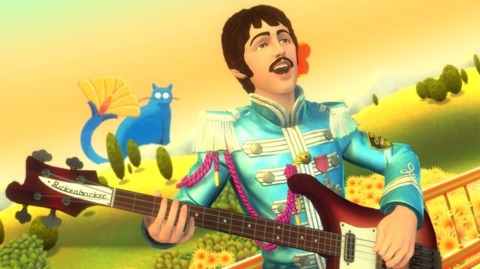Analysts blame 2009 slump on music genre, lack of innovation
Industry watchers pull varying lessons from the year's retail wreckage, predict return to growth in 2010.
The industry-tracking NPD Group yesterday released its US retail sales figures for December, closing the book on a difficult year that saw industry revenues slip 8 percent, and for the analysts themselves.

In a note to investors, Pacific Crest Securities' Evan Wilson said 2009 was "certainly a year that many would like to forget." Wedbush's Michael Pachter echoed that in his own note, saying, "It is a relief to finally put 2009 behind us."
With consensus reached on that front, it became time to toss around blame for the year's poor performance, a topic on which there were more diverse sentiments. For example, Pachter laid much of the blame on the music genre, saying that software sales for December would have actually been up year-over-year if the music genre and its precipitous decline were removed from the equation.
"The year clearly demonstrated that the music genre phenomenon was not sustainable at last year's $1.66 billion level," Pachter said, "and this year's $876 million in sales, while impressive on a standalone basis, was 12 percent below the sales level in 2007."
Wilson said the culprit for the decline was a lower average selling price for games. And while he acknowledged the decline in the music genre contributed to that--specifically pricey full-band kits for series like Guitar Hero and Rock Band--he also cited an abundance of retail promotions that drove prices down during the year.
"The economy and weak release slate have clearly taken their toll," Wilson noted.
Electronic Entertainment Design and Research analyst Jesse Divnich acknowledged that decline in music games was "likely the biggest factor" for the year's sinking software sales, but he suggested it was a symptom of another, larger cause.
"All too often the economy is blamed for the recent industry contraction," Divnich said. "In reality, decreased sales in 2009 had more to do with a lack of innovation than economic recession. The growth of our industry now rests more on innovation than it ever has before, especially since nontraditional and casual markets consist of a larger share than in previous years. No longer can developers update a few maps, design some new weapons, add a few new characters, then throw a roman numeral at the end of the box and call it a 'sequel.' That may work for core targeted games (action, shooters, and RPGs), but this strategy is not ideal for nontraditional and casual gamers. "
To back up his assertion, Divnich noted that sequels in casual and mainstream-focused games often sell fewer copies than their predecessors, whereas sequels aimed at traditional gamer markets frequently grow sales with each iteration. On the Wii alone, Divnich pointed to Boom Blox, Brain Age, Guitar Hero III, The Bigs, Mario & Sonic at the Olympics, Rayman Raving Rabbids, and Cooking Mama as casual-oriented games that did better than their sequels.
On the other end of the spectrum, Divnich noted that games rated M for Mature (or 16+ and 18+ under PEGI) performed better than any other ratings group in 2009, with revenues flat year-over-year while every other category suffered double-digit declines.
"In fact, over the last five years, Mature games have had one of the most stable economies and reinforces a theory that whether a recession or economic boom, the core of our industry has and will continue to remain healthy," Divnich said.
Just as the analysts had different takes on what caused the decline of 2009, they offered varied projections for the current year. Pachter's predictions were the most detailed, as he pegged full-year software sales growth at 10 percent.
"We think that it is likely that sales will grow slightly in February, hit high single digits in March, and hit double-digit growth from April through October," Pachter said.
Wilson didn't offer an outlook for the full year, but he was slightly more pessimistic on the first quarter of the year, saying, "We expect January and February results to be down mid-single digits and for March to be up mid-single digits, for total Q1 results that are roughly flat year over year."
Divnich didn't give his predictions for software at all, but his full-year hardware forecast called for the number of systems sold to be down a sobering 17 percent. Divnich expects the DS, Wii, and PSP to be responsible for most of the decline, with the PlayStation 3 and Xbox 360 "likely to post modest unit gains in 2010."
Got a news tip or want to contact us directly? Email news@gamespot.com
Join the conversation